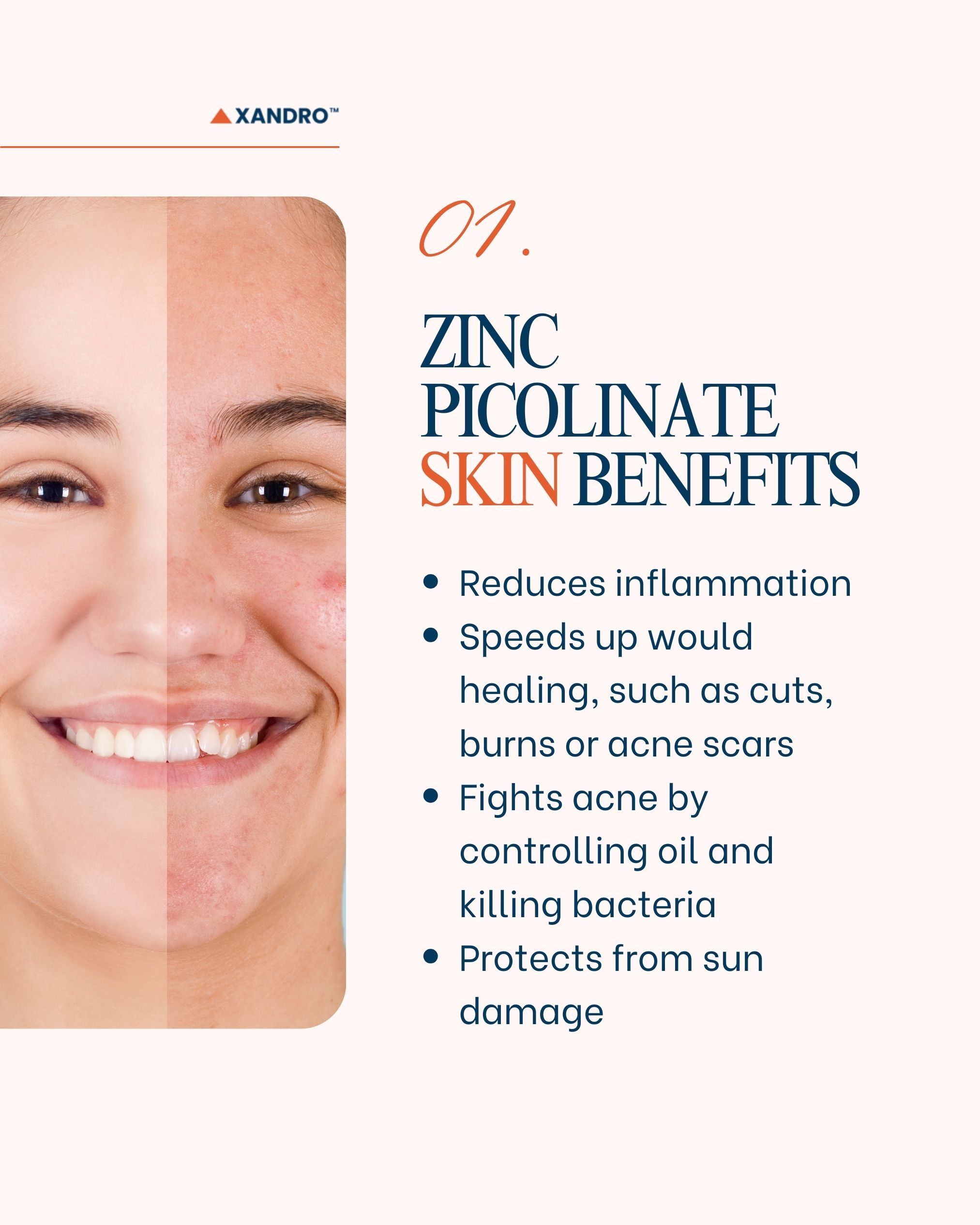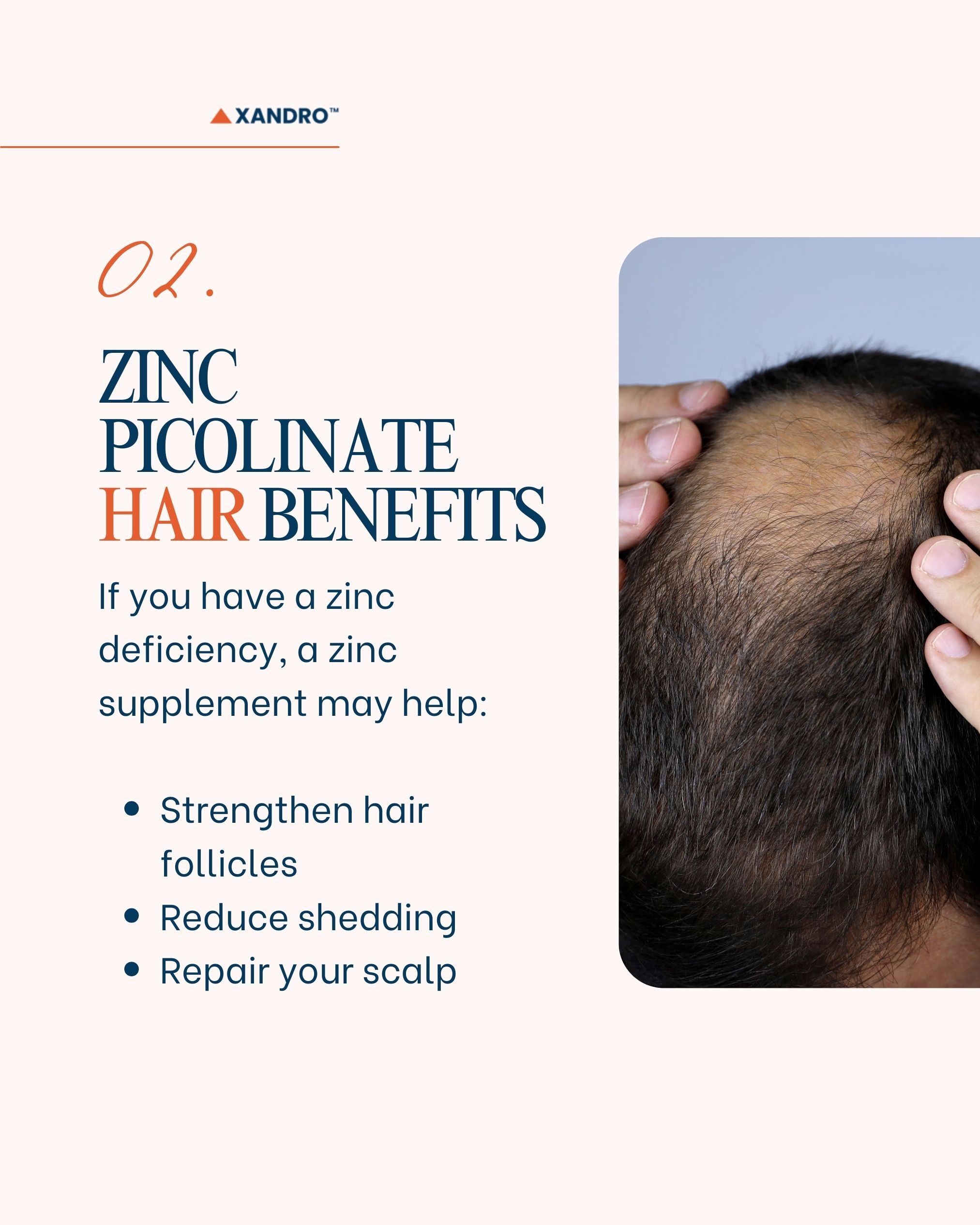23 Zinc Picolinate FAQs: Benefits, Dosage & Best Form! — Part 2
26th May 2025
All About Zinc Picolinate: Your Top 23 Questions Answered! Part 2
In part one of our FAQs about zinc picolinate, we answered a range of your questions about the benefits of zinc picolinate, what it’s good for, when to take it and how to tell if you’re deficient.
In part two, we cover more about what zinc picolinate does for your body, such as for your skin, weight and hair, plus how much you should take each day.
What Does Zinc Do to Skin?
Zinc works like a natural skin protector and healer in your body. For skin, it:
- Reduces Inflammation: Zinc calms irritated skin, making it helpful for conditions like acne, rosacea, or eczema. It’s why many diaper rash creams contain zinc oxide!
- Speeds Up Wound Healing: If you have cuts, burns, or even acne scars, zinc helps your skin cells regenerate faster.
- Fights Acne: Zinc controls oily skin by regulating sebum (your skin’s natural oil) and kills acne-causing bacteria. Many people notice fewer breakouts within 4–6 weeks of taking it.
- Protects from Sun Damage: Zinc oxide (used in sunscreens) physically blocks UV rays, but taking zinc internally may also help repair sun-damaged skin over time.
After speaking with a doctor, take 15–30mg of zinc picolinate daily with food, and pair it with vitamin A (like sweet potatoes or carrots) for even clearer skin.

Why Do I Feel So Good After Taking Zinc?
If you suddenly feel more energetic, focused, or happier after starting zinc, it’s likely because your body was low on this important mineral. Here’s why:
- Boosts Immunity: Zinc helps your white blood cells fight infections, so you might stop getting sick as often.
- Increases Energy: Zinc helps convert food into fuel. If you were deficient, you may feel less tired.
- Sharpens Brain Function: Zinc supports neurotransmitters (brain chemicals) that affect focus and memory. Low zinc is linked to brain fog.
- Balances Mood: Zinc regulates stress hormones like cortisol and boosts serotonin (the ‘happy hormone’). People with anxiety or depression often have lower zinc levels.
These effects are most noticeable if you are deficient. If your zinc levels were already normal, you might not feel a dramatic difference.
Read more about Zinc Picolinate and its Benefits.
Can I Take Zinc and Magnesium Together?
Zinc and magnesium are a powerful combination because they support different but complementary functions, so they can be taken together. Zinc helps immunity, skin health and hormone balance, while magnesium helps with relaxation, muscle recovery and sleep. Try taking zinc picolinate (15–25mg) and magnesium glycinate (200–400mg) before bed or with food to reduce the chance of stomach upset.
Check out the first of our Magnesium Glycinate FAQ posts to learn more!
Does Zinc Help with Weight Loss?
Zinc isn’t a weight-loss miracle, but it can indirectly help if you’re deficient. It supports thyroid function, which controls metabolism. Low zinc can slow it down, making weight loss harder. It curbs cravings by regulating leptin (the hormone that tells your brain you’re full). Deficiency may lead to overeating. It also boosts energy by helping with nutrient absorption, so you have less fatigue during workouts.
Just note that if you already get enough zinc from food (like meat, nuts, or shellfish), extra zinc won’t melt fat. Focus on diet and exercise first!
Learn more about whether zinc can help with weight loss!
Are There Any Zinc Picolinate Acne Benefits?
Zinc picolinate is one of the best forms of zinc for acne because it absorbs well and tackles multiple causes, such as reducing oil production for fewer clogged pores, killing bacteria and calming redness due to its anti-inflammatory effects.
For mild acne, you may see improvements in 4–8 weeks, while for more severe acne, you may need higher doses (30–40mg/day) under a doctor’s supervision.
You can also pair zinc with vitamin A (like cod liver oil) for even better results as they work together to heal skin.
Zinc Picolinate for Hair Loss?
Zinc benefits for hair include helping for hair loss if you have a zinc deficiency. It helps strengthen hair follicles by building keratin, the protein your hair is made out of, reducing shedding, as low zinc can trigger excessive hair loss (telogen effluvium) and also helps to repair your scalp by fighting dandruff and dryness that weaken hair roots.
If deficient, you may notice thicker hair in 3–6 months (take 15–30mg/day), but if hair loss is genetic (like male/female pattern baldness), zinc might slow thinning but won’t regrow hair.
Take zinc with biotin and iron (if low) for maximum hair growth support.
Further Reading: Are Hair, Skin and Nail Supplements Worth It?

Zinc Picolinate vs. Zinc Gluconate?
Zinc Picolinate absorbs really well because it's bound to picolinic acid, which helps your gut take in more zinc. This makes it great for daily immune support, fixing deficiencies and improving skin and hair health.
Zinc gluconate, on the other hand, is cheaper and works fine, but your body doesn’t absorb it as efficiently. It’s often used in cold lozenges (because it helps fight throat infections) and for short-term immune boosts (like during flu season)
If you want the best absorption for long-term health, go with picolinate. If you just need something for occasional colds, gluconate works too.
Zinc Picolinate vs. Zinc Bisglycinate?
Both zinc picolinate and zinc bisglycinate are high-quality, but they have slight differences.
Zinc picolinate is best for immunity and severe deficiencies , as it absorbs very well, although it might cause mild nausea if taken on an empty stomach
Zinc bisglycinate, on the other hand, is gentler on digestion, so it’s great for those with sensitive stomachs. It also absorbs well, but may be slightly better for sleep and relaxation (since glycine is calming).
So, if you have digestive issues, choose zinc bisglycinate, but if you need maximum absorption (for skin, immunity, or deficiency), choose zinc picolinate.
Zinc Picolinate vs Zinc Citrate?
Zinc citrate is a decent middle-ground option that absorbs better than gluconate but not as well as picolinate. It has a mild taste, so it’s often used in chewable or liquid supplements, making it good for kids or people who dislike pills.
Zinc picolinate still wins for faster results (better for deficiencies) and for stronger immune and skin benefits.
How Much Zinc Picolinate Per Day?
The right zinc picolinate dosage depends on your needs:
- Basic health (men/women): 8–11mg/day (this covers most people’s needs)
- For acne, hair loss, or immunity: 15–30mg/day (short-term, unless a doctor says otherwise)
- Upper limit: Never take more than 40mg/day without supervision (too much can cause nausea or copper deficiency)
Who might need more zinc picolinate? Pregnant and breastfeeding women, vegetarians and vegans (plant zinc doesn’t absorb as well), as well as people with digestive disorders (like Crohn’s disease) may need to take more zinc.
How Does Zinc Help the Immune System?
Zinc is like your immune system’s ‘bodyguard,’ as it boosts white blood cells, helping attack germs faster, fights viruses by stopping cold viruses from multiplying in your throat and nose, reduces inflammation (too much weakens immunity) and heals wounds faster.
Take 15–25mg of zinc picolinate daily during cold/flu season, or if you’re often run down.
Need to buy Zinc Picolinate to help with your health needs? Check out where to buy Zinc Picolinate in Singapore!
End Note
We hope this answered your remaining questions about zinc picolinate! Remember to check with your doctor before starting it and stick to the recommended dose.For a high-quality option, try Xandro’s Zinc Picolinate + C — it combines zinc with vitamin C for better absorption, immunity and healing. Give it a try if you need a zinc boost!
